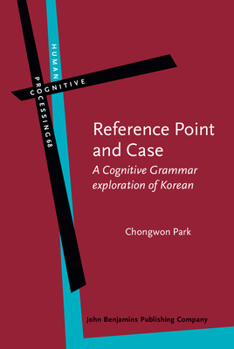Reference Point and Case: A Cognitive Grammar Exploration of Korean
(Book #68 in the Human Cognitive Processing: Cognitive Foundations of Language Structure and Use Series)
This monograph answers the rarely discussed questions of why complicated grammatical case phenomena exist in Korean and what the connection is between the case forms and their functions. The author argues that the case forms in Korean reflect patterns of the human cognitive process. While this approach may seem rather obvious to non-linguists, it is indeed a novel claim in contemporary linguistic theory. In order to provide technical analyses of Korean case phenomena such as multiple nominative/accusative, non-nominative subject, and adverbial case constructions, this book adopts an independently established descriptive construct known as reference point in the framework of Cognitive Grammar. The author demonstrates that the notion of reference point not only explains a substantially wider set of data, but also leads to a more reasonable generalization. The intended readership of this book are researchers who are interested in case phenomena, irrespective of their theoretical orientation.
Format:Hardcover
Language:English
ISBN:9027204292
ISBN13:9789027204295
Release Date:December 2019
Publisher:John Benjamins Publishing Company
Length:264 Pages
Customer Reviews
0 rating





